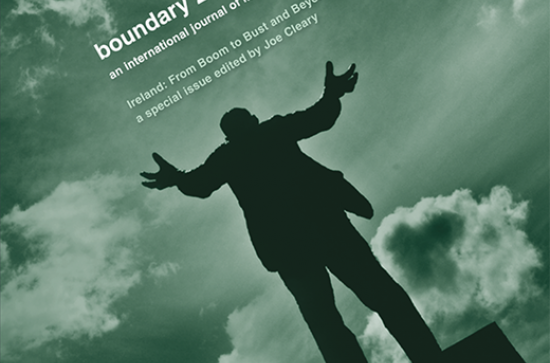
‘Ireland: from boom to bust and beyond’ is a recently published special issue of boundary2, an international journal of literature and culture. With essays on politics, economics, history and literature the special issue offers a significant and timely appraisal of contemporary Irish culture. Its appearance also marks a notable recognition of Irish scholarship by an internationally renowned journal.
This special issue was edited by Professor Joe Cleary, now at Yale but formerly at the English Department at MU. Among the other contributors are: Seamus Deane on the history of republican thought; Heather Liard on Sean O’Faoláin; Daniel Finn on politics; Gail McConnell and Mary McGlynn on contemporary literature; Willa Murphy on religion and spiritualty.
The special issue includes an essay on contemporary sexual politics by Michael G. Cronin of the MU Department of English.
Cronin’s essay assesses recent scholarship on Irish sexual history, evaluating how effectively Irish intellectuals help us understand the transformative evolution of Irish sexual culture that led to events such as the 2015 marriage referendum. He argues that this scholarship, for all its diversity and energy, tends to fall back on received ideas and schematic models of secularisation and modernisation.
These scholarly accounts of changing sexual norms fail to grapple with the contradictory, dynamic and uneven tempo of social change. They stress an elitist anti-democratic conception of state-driven change over the potential of social movements mobilising ordinary citizens. Above all, they underestimate the agency of people navigating such changes in their intimate lives.
Nevertheless, the essay concludes with an assessment of emergent work – including, among others, that of Maynooth sociologist Paul Ryan – which promises new intellectual models for grappling with these complex questions. This emergent scholarship draws on the radical potential of materialist and bio-political strands in contemporary feminism and queer theory and is more fully cognizant of the complex interaction between the local and the global.
This essay reiterates the urgency of Irish scholars re-conceiving human sexuality, less as a natural drive repressed by puritanical institutions than as human potentialities, desires and affects that are intimately shaped by the material conditions of an exploitative global system.
